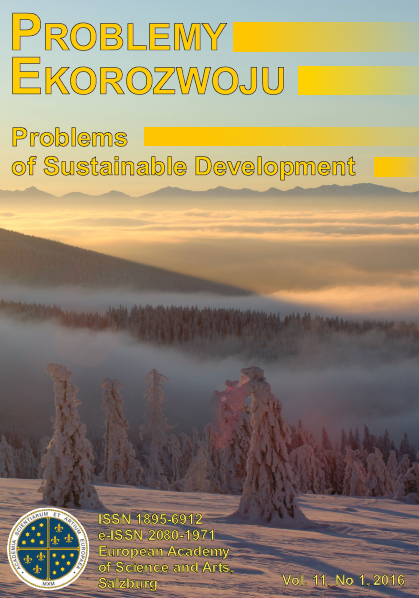The Impact of Sustainable Development on the Homeostasis of the Social Environment and the Matter of Survival
Article Sidebar
Issue Vol. 11 No. 1 (2016)
-
Education and the Problems of Sustainable Development
Delyse Springett7-14
-
Ecophilosophy in Modern East Asia: The Case of Hansalim in South Korea
Michael S. Pak, Jeehyun Kim15-22
-
The Concept of Nobilis Barbarus in the Light of Contemporary Ecological Challenges
Ryszard F. Sadowski23-30
-
Discourses of Ecology and the Sketches of Creative Ecology in the Context of Sustainable Development
Tomas Kačerauskas31-39
-
The Impact of Sustainable Development on the Homeostasis of the Social Environment and the Matter of Survival
Wiesław Sztumski41-47
-
The Anthropocentric Sozology of Julian Aleksandrowicz
Leszek Gawor49-58
-
Tax Payment, Social Contribution for Pollution Prevention and Happiness
Jing Xu, Jianjun Li59-64
-
Changes in Environmental Attitudes in Selected Countries of Central and Eastern Europe
Paweł Rydzewski65-72
-
Designing a Mixed Evaluating System for Green Manufacturing of Automotive Industry
Yuhong Cao, Jianxin You, Rui Wang, Yongjiang Shi73-86
-
Comparative Evaluation of Experience in Environmental Tax Reforms in Chosen EU States
Astrida Miceikiene, Valdemaras Makutenas, Jan Zukovskis, Artur J. Kożuch87-99
-
Cultural Ecosystem Services – Framework, Theories and Practices
Anna Dłużewska101-110
-
Joseph Kozielecki’s Project of Temporal Transgression and the Philosophy of Sustainable Development
Marek Tański111-116
-
Sustainable Development in the World from the Aspect of Environmental Health and Human Development Index: Regional Variations and Patterns
Slavomir Bucher117-124
-
Rebuilding the Pillars of Sustainable Society Index: a Multivariate Post Hoc I-distance Approach
Dejan Savić, Veljko Jeremić, Nataša Petrović125-134
-
Agricultural Biodiversity for Sustainable Development
Piotr Krajewski135-141
-
Factory Farming Versus Environment and Society. The Analysis of Selected Problems
Ignacy S. Fiut, Marcin Urbaniak143-156
-
Urbanization, Food Insecurity and Agriculture – Challenges for Social Sustainable Development
Karthika Palanisamy, Karthikeyan Parthasarathy157-162
-
Ecological Entrepreneurship and Sustainable Development
Elena Mieszajkina163-171
-
Sustainable Mitigation of Greenhouse Gases Emissions
Wojciech Cel, Aneta Czechowska-Kosacka, Tao Zhang173-176
-
Sustainable Development versus Prospecting and Extraction of Shale Gas
Aneta Duda, Justyna Gołębiowska, Agnieszka Żelazna177-180
Archives
-
Vol. 13 No. 2
2023-10-15 22
-
Vol. 13 No. 1
2018-01-02 23
-
Vol. 12 No. 2
2017-07-03 18
-
Vol. 12 No. 1
2017-01-02 16
-
Vol. 11 No. 2
2016-07-01 17
-
Vol. 11 No. 1
2016-01-04 20
-
Vol. 10 No. 2
2015-07-01 17
-
Vol. 10 No. 1
2015-01-05 16
-
Vol. 9 No. 2
2014-07-01 16
-
Vol. 9 No. 1
2014-01-02 19
Main Article Content
Authors
Abstract
The survival of social groups depends on internal factors (the size of a group, its socio-diversity, inner organization, coherence and synergy of actions for the common good), external factors, mostly on a safe natural and social environment, and on sustainable interactions with this environment. In addition, the survival and development of groups is determined by their stability, which in turn depends on the homeostatic mechanisms that maintain a state of balance within groups and in their environments. People have an influence on the stability of social systems; their actions may lead to strengthening or weakening of this homeostasis. The implementation of the concept of sustainable development serves, among others, to strengthen the homeostasis of social systems and consequently, to prolong the existence of mankind. However, paradoxically enough, the more the system tends to equilibrium, the less stable it becomes reducing its chance of survival. But still, striving to achieve a state of equilibrium has become an imperative nowadays in view of the concept of sustainable development. Moreover, since the beginning of the Anthropocene era, people’s interference in the homeostasis of natural and social systems has been growing, helped by the progress of science and technology. However, only a handful of the world’s population, the financial elite, benefit from this. Driven by economic interests and ignoring ecological criteria, they weaken this homeostasis carelessly and irresponsibly. Focused on their own benefits here and now, they do not care much about the fate of future generations.
Keywords:
References
ADAMIK A., MATEJUN M., 2012, Organiza-cja i jej miejsce w otoczeniu, in: ed. Bielawska A., Podstawy zarządzania, Oficyna Wolters Kluwer Business, Warsaw.
POPE FRANCIS, 2013, Dlaczego Kościół jest katolicki, czyli powszechny?, http:www.fronda.pl/a/papiez-franciszek-dlaczego-kosciol-jest-katolicki-czyli-powszechny,31176.html (10.10.2013).
KIESERLING A., 2015, Der Terror Der Leis-tungsgerechtigkeit, in: Frankfurter Allgemeine Zeitung–Wisssen, 13.08.2015.
KOCHLAR R., 2015, A Global Middle Class Is More Promise than Reality, Pew Research Center, July 8.
KURATOWSKI K., MOSTOWSKI A., 1952, Teoria mnogości, Warsaw.
LESZKOWSKA A., 2013, Utracona cześć ekonomii, z prof. Elżbietą Mączyńską rozmawia Anna Leszkowska, in: Sprawy Nauki, No 11.
SZTUMSKI W., 2012, Co z miłością bliźniego, gdy jeden ... drugiego?, in: Sprawy Nauki, No 12.
TISCHNER J., 2005, Etyka Solidarności, Cracow.
WOŚ J., 2001, Rynek i państwo w modelach współczesnej gospodarki rynkowej, in: Ruch prawniczy, ekonomiczny i socjologiczny, LXIII, Vol. 4.
Article Details
Abstract views: 66
License

This work is licensed under a Creative Commons Attribution-ShareAlike 4.0 International License.


